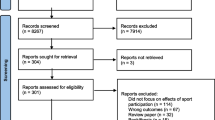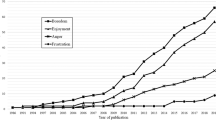Abstract
Competitive orientations of 237 male and female undergraduates enrolled in competitive and noncompetitive physical activity classes were investigated using the Work and Family Orientation Questionnaire [WOFO: R. L. Helmreich and J. T. Spence, “The Work and Family Orientation Questionnaire: An Objective Instrument to Assess Components of Achievement Motivation and Attitudes Toward Family and Career,” Catalog of Selected Documents in Psychology, 1978, 8(2) (Document #1677)] and a Competitiveness Inventory. Factor analysis confirmed the four WOFO dimensions proposed by Helmreich and Spence (mastery, work, competitiveness, personal unconcern). Factor analysis of the Competitiveness Inventory revealed three factors termed competitiveness, goal orientation, and win orientation. Sex × Activity Class (competitive or noncompetitive) (2 × 2) multivariate analyses revealed sex differences on the WOFO scores, both sex and activity differences on the Competitiveness Inventory scores, and no interactions. Sex differences on the WOFO scores confirmed Spence and Helmreich's findings; females scored higher on work and males scored higher on competitiveness. On the Competitiveness Inventory, males scored slightly higher than females on competitiveness, but most of the multivariate sex difference was due to males scoring higher on win orientation and females scoring higher on goal orientation. In contrast, the multivariate activity difference was due primarily to competitiveness; students in competitive activities scored considerably higher on competitiveness than students in noncompetitive activities. The findings suggest that sport-achievement orientation has a unique factor structure and provide evidence supporting the validity of the sport-specific, multidimensional Competitiveness Inventory.
Similar content being viewed by others
References
Ahlgren, A., & Johnson, D. W. Sex differences in cooperative and competitive attitudes from the 2nd through the 12th grades. Developmental Psychology, 1979, 15, 45–49.
Boutilier, M. A., & SanGiovanni, L. The sporting woman. Champaign, Ill.: Human Kinetics, 1983.
Condry, J., & Dyer, S. Fear of success: Attribution of cause to the victim. Journal of Social Issues, 1976, 32, 63–83.
Deaux, K. The behavior of men and women. Monterey, Calif.: Brooks/Cole, 1976.
Deaux, K. From individual differences to social categories. American Psychologist, 1984, 39, 105–116.
Duda, J. A multidimensional approach to the study of sex and cultural differences in motivation. Paper presented at the North American Society for the Psychology of Sport and Physical Activity Conference, East Lansing, Michigan, 1983.
Eccles (Parsons), J. Expectations, values and academic behaviors. In J. T. Spence (Ed.), Achievement and achievement motives. San Francisco, Calif.: W. H. Freeman, 1983.
Eccles (Parsons), J., Adler, T., & Meece, J. L. Sex differences in achievement: A test of alternate theories. Journal of Personality and Social Psychology, 1984, 46, 26–43.
Frieze, I. H., Parsons, J. E., Johnson, P. B., Ruble, D. N., & Zellman, G. L. Women and sex roles: A social psychological perspective. New York: W. W. Norton, 1978.
Gill, D. L., & Martens, R. The role of task type and success-failure in group competition. International Journal of Sport Psychology, 1977, 8, 160–177.
Helmreich, R. L., Beane, W. E., Lucker, G. W., & Spence, J. T. Achievement motivation and scientific attainment. Personality and Social Psychology Bulletin, 1978, 4, 222–226.
Helmreich, R. L., & Spence, J. T. The work and Family Orientation Questionnaire: An objective instrument to assess components of achievement motivation and attitudes toward family and career. Catalog of Selected Documents in Psychology, 1978, 8(2). (Document #1677).
Horner, M. S. Sex differences in achievement motivation and performance in competitive and noncompetitive situations. Unpublished doctoral dissertation, University of Michigan, 1968.
Lenney, E. Women's self-confidence in achievement situations. Psychological Bulletin, 1977, 84, 1–13.
Marten,, R. Sport Competition Anxiety Text. Champaign, Ill.: Human Kinetics, 1977.
Martens, R., & Gill, D. L. State anxiety among successful and unsuccessful competitors who differ in competitive trait anxiety. Research Quarterly, 1976, 47, 698–708.
Martens, R., & Simon, J. Comparison of three predictors of state anxiety in competitive situations. Research Quarterly, 1976, 47, 381–387.
McClelland, D. C., Atkinson, J. W., Clark, R. A., & Lowell, E. L. The achievement motive. New York: Appleton-Century-Crofts, 1953.
National Federation of State High School Associations. Interscholastic athletic participation survey, September 15, 1980.
Olds, D. E., & Shaver, P. Masculinity, femininity, academic performance and health: Further evidence concerning the androgyny controversy. Journal of Personality, 1980, 48, 323–341.
Scanlan, T. K. The effects of success-failure on the perception of threat in a competitive situation. Research Quarterly, 1977, 48, 144–153.
Spence, J. T., & Helmreich, R. L. Masculinity and femininity: Their psychological dimensions, correlates and antecedents. Austin: University of Texas Press, 1978.
Spence, J. T., & Helmreich, R. L. Achievement-related motives and behaviors. In J. T. Spence (Ed.), Achievement and achievement motives. San Francisco, Calif.: W. H. Freeman, 1983.
Stein, A. H., & Bailey, M. M. The socialization of achievement orientation in females. Psychological Bulletin, 1973, 80, 345–366.
Toufexis, A. The shape of the nation. Time, October 7, 1985, pp. 60–61.
Tresemer, D. W. Fear of success. New York: Plenum, 1977.
Author information
Authors and Affiliations
Additional information
The assistance of Thomas Deeter and Carol Gruber with data collection and analysis is gratefully acknowledged.
Rights and permissions
About this article
Cite this article
Gill, D.L. Competitiveness among females and males in physical activity classes. Sex Roles 15, 233–247 (1986). https://doi.org/10.1007/BF00288314
Issue Date:
DOI: https://doi.org/10.1007/BF00288314




